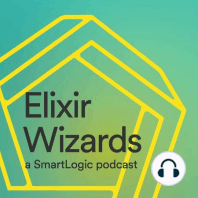29 min listen
Garbage Collection in Erlang vs JVM/Akka with Manuel Rubio & Dan Plyukhin
FromElixir Wizards
ratings:
Length:
44 minutes
Released:
Nov 30, 2023
Format:
Podcast episode
Description
Today on Elixir Wizards, Manuel Rubio, author of Erlang/OTP: A Concurrent World and Dan Plyukhin, creator of the UIGC Actor Garbage Collector for Akka, join host Dan Ivovich to compare notes on garbage collection in actor models.
The discussion digs into the similarities and differences of actor-based garbage collection in Erlang and Akka and introduces Dan's research on how to perform garbage collection in a distributed actor system.
Topics discussed:
Akka is akin to Erlang actors for the JVM using Scala, with similar principles like supervision trees, messages, and clustering
Erlang uses generational garbage collection and periodically copies live data to the old heap for long-lived elements
Actor GC aims to determine when an actor's memory can be reclaimed automatically rather than manually killing actors
Distributed actor GC is more challenging than object GC due to the distributed nature and relationships between actors across nodes
Challenges include reasoning about failures like dropped messages and crashed nodes
GC balance requires optimization of resource release and CPU load management
Immutability helps Erlang GC, but copying data for messages impacts performance
Research into distributed actor GC is still ongoing, with opportunities for improvement
Fault tolerance in Erlang relies on user implementation rather than low-level guarantees
Asynchronous messages in Erlang/Elixir mean references may become invalid which is similar to the distributed GC approaches in Dan's research
Idempotent messaging is recommended to handle possible duplicates from failures
Help your local researcher! Researchers encourage communication from practitioners on challenges and use cases
Links mentioned:
Erlang/OTP Volume 1: A Concurrent World by Manuel Rubio https://altenwald.com/en/book/en-erlang-i
Scala https://www.scala-lang.org/
Akka Framework https://github.com/akka
JVM (Java Virtual Machine) https://www.java.com/en/download/
The BEAM VM https://www.erlang.org/blog/a-brief-beam-primer/
Hadoop Framework https://hadoop.apache.org/
Pony Programming Language https://www.ponylang.io/
SLSA Programming Language https://wcl.cs.rpi.edu/salsa/#:~:text=SALSA%20
Paxos Algorithm https://en.wikipedia.org/wiki/Paxos(computerscience)
Raft library for maintaining a replicated state machine https://github.com/etcd-io/raft
Dan's Website https://dplyukhin.github.io/
Dan Plyukhin on Twitter: https://twitter.com/dplyukhin
Dan Plyukhin’s YouTube channel: https://www.youtube.com/channel/UCFG9RhkWNnUhosC3l99Y8Zw
UIGC on GitHub https://github.com/dplyukhin/UIGC
Manuel's Website https://altenwald.com/
Manuel Rubio on Twitter: https://twitter.com/MRonErlang Special Guests: Dan Plyukhin and Manuel Rubio.
The discussion digs into the similarities and differences of actor-based garbage collection in Erlang and Akka and introduces Dan's research on how to perform garbage collection in a distributed actor system.
Topics discussed:
Akka is akin to Erlang actors for the JVM using Scala, with similar principles like supervision trees, messages, and clustering
Erlang uses generational garbage collection and periodically copies live data to the old heap for long-lived elements
Actor GC aims to determine when an actor's memory can be reclaimed automatically rather than manually killing actors
Distributed actor GC is more challenging than object GC due to the distributed nature and relationships between actors across nodes
Challenges include reasoning about failures like dropped messages and crashed nodes
GC balance requires optimization of resource release and CPU load management
Immutability helps Erlang GC, but copying data for messages impacts performance
Research into distributed actor GC is still ongoing, with opportunities for improvement
Fault tolerance in Erlang relies on user implementation rather than low-level guarantees
Asynchronous messages in Erlang/Elixir mean references may become invalid which is similar to the distributed GC approaches in Dan's research
Idempotent messaging is recommended to handle possible duplicates from failures
Help your local researcher! Researchers encourage communication from practitioners on challenges and use cases
Links mentioned:
Erlang/OTP Volume 1: A Concurrent World by Manuel Rubio https://altenwald.com/en/book/en-erlang-i
Scala https://www.scala-lang.org/
Akka Framework https://github.com/akka
JVM (Java Virtual Machine) https://www.java.com/en/download/
The BEAM VM https://www.erlang.org/blog/a-brief-beam-primer/
Hadoop Framework https://hadoop.apache.org/
Pony Programming Language https://www.ponylang.io/
SLSA Programming Language https://wcl.cs.rpi.edu/salsa/#:~:text=SALSA%20
Paxos Algorithm https://en.wikipedia.org/wiki/Paxos(computerscience)
Raft library for maintaining a replicated state machine https://github.com/etcd-io/raft
Dan's Website https://dplyukhin.github.io/
Dan Plyukhin on Twitter: https://twitter.com/dplyukhin
Dan Plyukhin’s YouTube channel: https://www.youtube.com/channel/UCFG9RhkWNnUhosC3l99Y8Zw
UIGC on GitHub https://github.com/dplyukhin/UIGC
Manuel's Website https://altenwald.com/
Manuel Rubio on Twitter: https://twitter.com/MRonErlang Special Guests: Dan Plyukhin and Manuel Rubio.
Released:
Nov 30, 2023
Format:
Podcast episode
Titles in the series (100)
Shanti Chellaram on Pri-Queue and raft_erl – Elixir Internals: Today on the show we welcome Shanti Chellaram to talk about a couple of Erlang libraries she has created! We hear from her about Pri-Queue and raft_erl, and her motivation behind making them and some of the things we wishes she did differently! Shanti shares some of her background, early coding experiences, affinity for open source and her current work situation. From there we look at Pri-Queue, the problem it addresses and what a priority queue is. by Elixir Wizards
